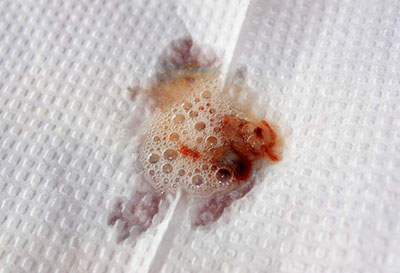
Hemoptysis is the medical term for coughing up blood or blood-tinged mucus from the respiratory track, which includes the lungs and throat. It's not the same as bleeding coming from the mouth, or gastrointestinal track. Although coughing a small amount of blood may not be a cause of concern, it can be a sign of a serious medical condition, such as infections, cancer, or pulmonary embolism.
Types
Hemoptysis is divided into types based on how much blood was cough up over 24 hours. But in some cases, it can be hard to tell.
- Life-threatening or massive hemoptysis. Different experts have different guidelines for what this type involves. They range from 100 milliliters (mL) of blood to over 600 mL, or about a pint.
- Non-life-threatening or non-massive hemoptysis. This is also known as moderate or submassive hemoptysis. The range is between 20 and 200 mL (about a cup) of blood.
- Scant or mild hemoptysis. Cough up blood of less than 20 mL, less than a tablespoon.
Causes
There are many possible causes that can trigger coughing up blood. Common causes include:
- Bronchitis, either short-term (acute) or long-term (chronic)
- Lung cancer
- Damaged airways (bronchiectasis), especially because of cystic fibrosis
- Pneumonia
- Tuberculosis
- Chronic obstructive pulmonary disease (COPD)
Other causes include:
- Congestive heart failure, especially because of mitral stenosis
- Crack cocaine use
- Foreign objects in the respiratory airways
- Inflammatory or autoimmune conditions (such as lupus, granulomatosis with polyangiitis, microscopic polyangiitis, Churg-Strauss syndrome, Goodpasture disease, or Behcet disease)
- Lung abscess
- Non-cancerous lung tumors
- Parasitic infection
- Pulmonary arteriovenous malformations (AVMs)
- Pulmonary embolism
- Injuries from a gunshot wound or car accident
- Use of blood thinners (anticoagulants)
- Endometriosis
- Hughes-Stovin syndrome
- Hereditary hemorrhagic telangiectasia
- Sarcoidosis
In some cases, doctors can’t find a cause, but the hemoptysis usually goes away within 6 months.
Diagnosis
- Medical history and physical exam
- Chest X-ray
- CT scan
- Bronchoscopy
- Complete blood count (CBC)
- Urinalysis
- Blood chemistry profile
- Coagulation tests
- Arterial blood gas
- Pulse oximetry
Nursing Interventions
- Monitor the patient's vital signs closely.
- Monitor the patient's sputum for the amount and color of blood.
- Encourage the patient to rest and to avoid activities that may cause coughing.
- Provide the patient with mouth care and fluids.
- Administer medications as prescribed.
- Provide emotional support and reassurance to the patient and their family.
- Provide patient education. This may include teaching the patient about the importance of rest, avoiding smoking, and taking medications as prescribed.
In addition to the above, nurses should also be aware of the potential complications of hemoptysis, such as:
- Aspiration pneumonia: This can occur if the patient aspirates blood into their lungs.
- Choking: This can occur if the patient coughs up a large amount of blood.
- Hypovolemic shock: This can occur if the patient loses too much blood.
Treatment
Treatment for hemoptysis depends on how much blood has been cough up and the cause.
Life-threatening or massive hemoptysis
The doctor might advise to move the patient to the hospital’s intensive care unit (ICU). They may refer the patient to a pulmonologist and a cardiothoracic surgeon, doctors who specialize in the chest and respiratory tract.
Initial treatments could include:
- A tube that goes into the airways (intubation)
- Extra oxygen (ventilation and oxygenation)
- A body position in which the lung with possible bleeding is lower than the other lung
When your doctor finds the source of the bleeding, they might try to stop it with:
- Iced saline
- Medications to narrow blood vessels (vasoconstrictors) like epinephrine or vasopressin
- Medicines to help blood clot (coagulants) like tranexamic acid
- Tiny balloons or cuffs to put pressure on the area (bronchial blockade or balloon tamponade)
- Laser therapy
- Argon plasma coagulation (APC)
- Cryotherapy
- Embolization
In rare cases, surgery may be required. This could involve:
- Taking out one section (lobe) of the lung
- Removing the entire lung
When patient is out of danger, the doctor will treat the cause using:
- Antibiotics for pneumonia or tuberculosis
- Chemotherapy or radiation for lung cancer
- Steroids for inflammatory conditions
If the patient have very thin blood because of medications, blood transfusions or other medications to ease blood loss may be advised.
Nonlife-threatening or nonmassive hemoptysis
Treatment for the underlying condition will usually take care of bleeding that isn’t dangerous. If there is bronchitis, the most common cause of hemoptysis, the doctor prescribe antibiotics. They might also recommend cough medicine.
If patient is a smoker, the doctor may advise the patient to stop smoking.